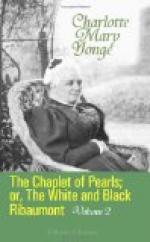’Alas! I would if I could! It is true, cousin, I have no heart to deceive you any longer. But it is to Madame de Quinet that you must apply, and if my brother has though me worth pursuit, you may be in time! One moment,’—as he would have sprung away as if in the impulse to fly to the rescue,—’cousin; had you gone to England as I hoped, I would have striven to deserve to win that love of yours, but you have conquered by your constancy. Now, father, I have spoken my last save as penitent.’
She covered her head and sank down again.
Berenger, bewildered and impelled to be doing something, let the priest lead him out before he exclaimed, ’I said nothing to her of pardon!’
‘You do pardon?’ said the priest.
He paused a moment. ’Freely, if I find my wife. I can only remember now that she set me on the way. I would ease her soul, poor thing, and thinking would make me hard again.’
‘Do the English bring up their sons with such feelings?’ asked the cure, pausing for a moment.
‘Of course,’ said Berenger. ‘May I say that one word, sir?’
‘Not now,’ said the priest; ’she had better be left to think of her sin towards Heaven, rather than towards man.’
‘But do you leave her there, sir?’
‘I shall return. I shall pray for her true penitence,’ said the priest, and Berenger perceived from his tone that one without the pale might inquire no further. He only asked how safe and honourable shelter could be found for her; and the cure replied that he had already spoken to her of the convent of Lucon, and should take her there so soon as it could safely be done, and that Abbess Monique, he trusted, would assist her crushed spirit in finding the path of penitence. He thought her cousin had better not endeavour to see her again; and Berenger himself was ready to forget her very existence in his burning anxiety to outstrip Narcisse in the quest of Eustacie.
CHAPTER XLI. OUR LADY OF HOPE
Welcome to danger’s hour,
Brief greeting serves the time of strife.—SCOTT
As soon as it was possible to leave Nissard, Berenger was on his way back to head-quarters, where he hoped to meet the Duke de Quinet among the many Huguenot gentlemen who were flocking to the Bourbon standard; nor was he disappointed in the hope, for he was presented to a handsome middle-aged gentleman, who told him, with much politeness, that his mother had had the honour to receive and entertain Mme. de Ribaumont and that some months ago he had himself arranged for the conveyance of her letters to England, but, he said, with a smile, he made a point of knowing nothing of his mother’s guests, lest his duties as a governor might clash with those of hospitality. He offered to expedite M. de Ribaumont’s journey to Quinet, observing that, if Nid de Merle were, indeed, on the point of seizing the lady, it must be by treachery;




